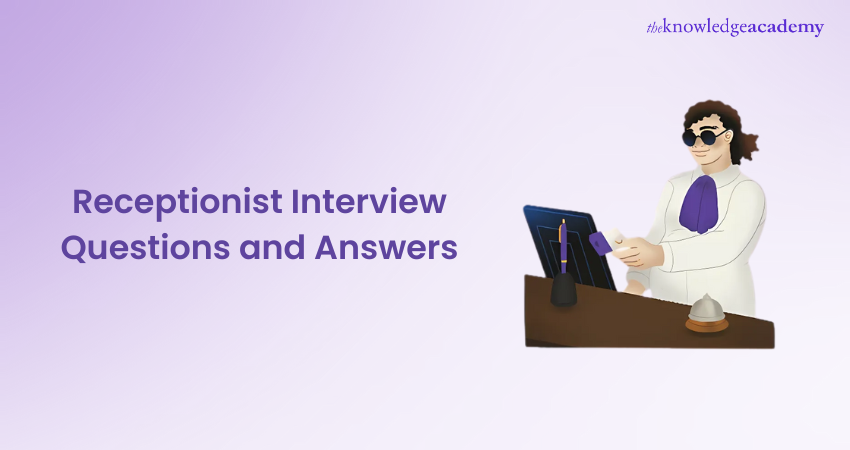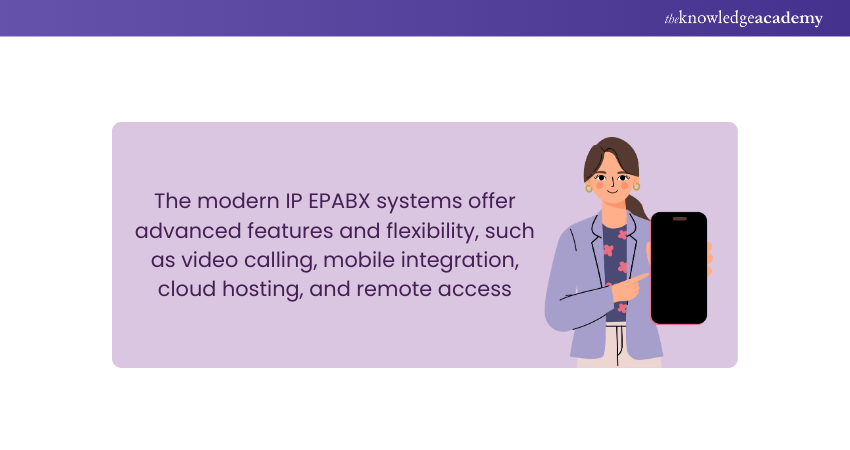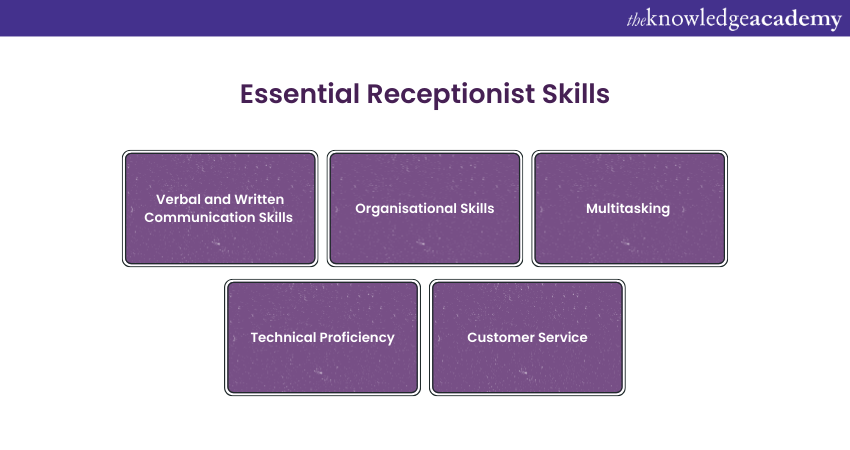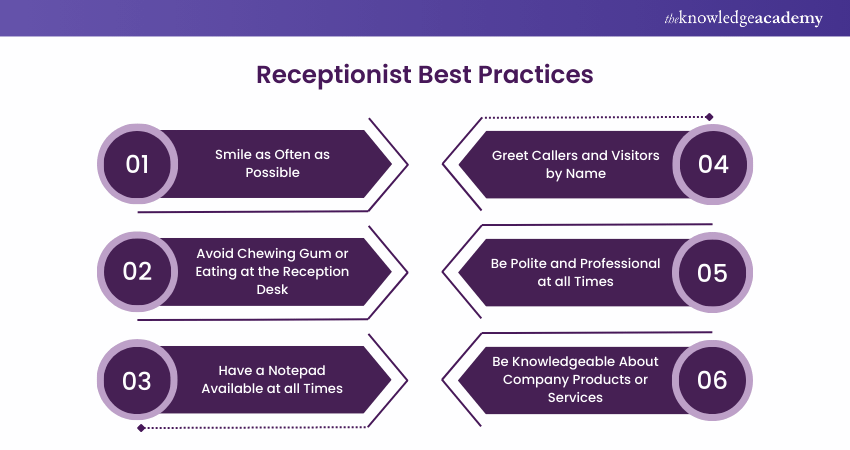We may not have the course you’re looking for. If you enquire or give us a call on 800600725 and speak to our training experts, we may still be able to help with your training requirements.
Training Outcomes Within Your Budget!
We ensure quality, budget-alignment, and timely delivery by our expert instructors.

Being charming is only the tip of the iceberg when it comes to being a receptionist. Stepping into this role means being a seasoned multitasker and problem-solver and mastering the art of making a first impression. But to land this dynamic role, your skills first need to shine in the interview room. This blog assembles the most frequently asked Receptionist Interview Questions and Answers.
Be it showcasing how you juggle unending calls, multiple visitors, complicated schedules, and more, these Receptionist Interview Questions and Answers will make you ace the interview on the first attempt. So read on and secure your dream front desk job.
Table of Contents
1) 10+ Receptionist Interview Questions With Sample Answers
a) Have you worked as a receptionist before? If not, please say something about your relevant work experience
b) Do you have experience with EPABX and VOIP systems?
c) How would you handle a situation where a client or visitor asks you a question that you don’t know the answer to?
d) How would you deal with a complaint from a co-worker about you?
e) What software applications have you used in your previous jobs?
f) What do you think the Receptionist contributes to the office culture at any company?
g) How do you ensure the security of office communications?
h) How long have you been a fast typist, and what is your typing speed?
i) What basic office equipment can you operate?
j) How would you describe your ideal relationship with your office?
2) Conclusion
10+ Receptionist Interview Questions With Sample Answers
Here are the questions you can expect during your interviews and the answers will help you build confidence and frame your strategy in responding to the interviewer:
1) Have you worked as a receptionist before? If not, please say something about your relevant work experience
This question tests your professional background and how your previous roles have prepared you for the receptionist position.
You can answer it this way: “While I haven’t held the title of a receptionist, I worked as an administrative assistant. In that role, I managed front desk duties, including greeting visitors and handling phone calls.”
2) Do you have experience with EPABX and VOIP systems?
You can answer this question like this:
“Yes, I have good experience with EPABX and VOIP systems. EPABX short for Electronic Private Automatic Branch Exchange, permits multiple extensions to share a single line. On the other hand, Voice Over Internet Protocol (VOIP) allows voice calls to be communicated over the internet. I have used both systems to make and receive and transfer phone calls, put calls on hold, and set up conference calls.”

3) How would you handle a situation where a client or visitor asks you a question you don’t know the answer to?
Here’s how you can answer this question:
“If a client or visitor asks me a question that I don’t know the answer to, I would handle the situation in the following way:
1) I would apologise for not knowing the answer and assure them I will find out as soon as possible.
2) I would ask them for their name and contact details and note down their question.
3) I would try to find the answer by consulting the relevant person or department, searching the organisation’s website or database, or using other reliable sources of information.
4) Depending on their preference, I would get back to the client or visitor with the answer as quickly as possible, either by phone, email or in person.
5) I would thank them for their patience and interest and ask them if they have any other questions or concerns.”
Enhance your minute-taking skills with our comprehensive Minute Taking Training – boost efficiency and accuracy in documenting crucial meeting details!
4) How would you deal with a complaint from a co-worker about you?
You can answer this question like this:
“If a co-worker complains about me, I would deal with it in the following way:
1) I would listen to their complaint in a calm manner and try to understand their perspective and feelings.
2) I would apologise for any mistake or misunderstanding that I may have caused and express my willingness to improve and learn from the feedback.
3) I would explain my side of the story and clarify any facts or assumptions that may have led to the complaint.
4) I would work with the co-worker to find a mutually agreeable solution or compromise to resolve the issue and prevent it from reoccurring.
5) I would follow up with the co-worker to make sure that the issue is settled and that there are no hard feelings or resentment.”

5) What software applications have you used in your previous jobs?
You can answer this question like this:
“I have used various software applications in my previous jobs, depending on the nature and requirements of the work. Some of the software applications that I have used are:
1) Microsoft Office: I have used Word, Excel, PowerPoint, and Outlook to create, edit, and share documents, spreadsheets, presentations, and emails.
2) Google Workspace: I have used Gmail, Calendar, Drive, Docs, Sheets, Slides, and Meet to communicate, collaborate, and store files online.
3) Zoom: I have used Zoom to conduct and join video and audio meetings, webinars, and chat sessions.
4) Salesforce: I have used Salesforce to manage customer relationships and dashboards, track leads and sales, and generate reports.
5) QuickBooks: I have used QuickBooks to handle numerous accounting, invoicing, and payroll tasks.”
6) What do you think the Receptionist contributes to the office culture at any company?
Here’s how you can answer this question:
“I think a Receptionist contributes to the office culture in the following ways:
1) The Receptionist creates a welcoming first impression for visitors, clients, and customers. This goes a long way to reflect the company’s values and brand.
2) The Receptionist inspires a friendly and supportive atmosphere among the staff, which improves teamwork and collaboration.
3) The Receptionist acts as a bridge between the different departments and levels of the organisation.
4) The Receptionist demonstrates reliability and efficiency, which sets a high standard for the quality of work and service.”
7) How do you ensure the security of the office communications?
You can answer this question like this:
“I ensure the security of the office communications by following these steps:
1) I use strong passwords and change them frequently for every device and accounts I use. I use for office communications, such as computers, phones, email, and software.
2) I do not share or disclose confidential or sensitive information with unauthorised persons, either verbally or in writing, and I verify the identity and legitimacy of the recipients before sending or forwarding any information.
3) I can encrypt any file that contains sensitive or confidential information with passwords or digital signatures, and I delete or shred any unnecessary or outdated copies.
4) I report any suspicious or unusual activity or request I encounter in the office communications, such as phishing emails, spam calls, or malware attacks.”
Elevate your career as an Executive Personal Assistant with our Perfect Executive Personal Assistant Training – gain the skills to excel in this dynamic role!
8) How long have you been a fast typist, and what is your typing speed?
You can answer this question like this:
“I have been a fast typist for over five years, and my typing speed is 75 words per minute. I developed my typing skills through online courses, practice tests, and typing games. I have also used different types of keyboards and software to enhance my typing accuracy and efficiency.”
9) What are the basic office equipment that you can operate?
Here’s how you can answer this question:
“I can operate the basic office equipment that is commonly used in a Receptionist’s role, such as:
1) Computers: I can access the internet, email, word processing, spreadsheets, databases, and other software applications.
2) Phones: I can use phones to make and receive calls, transfer calls, put calls on hold, and set up conference calls.
3) Printers: I can print, scan, copy, and fax documents and images.
4) Scanners: I can use scanners to scan and digitise documents and images and send them to email or cloud storage.
5) Fax Machines: I can use fax machines to send and receive fax messages and documents.”

10) How would you describe your ideal relationship with your office?
You can answer this question like this:
"My ideal relationship with my office is based on mutual respect, trust, and support. I would like to work in an office that:
1) Values and recognises my contributions and achievements as a Receptionist and provides me with opportunities for learning and growth.
2) Encourages and facilitates open and honest communication and feedback among the staff and management.
3) Promotes a positive and collaborative work environment where everyone works towards a shared goal and helps each other.
4) Promotes a healthy and balanced work-life culture where everyone respects each other’s time, needs, and preferences."
Unlock your career potential with our PA and Secretarial Courses – empower yourself with essential skills for success in the administrative world!
11) How do you organise your work schedule?
The interviewer is looking to evaluate your ability to manage time and tasks effectively.
You can answer along these lines: "I review any appointments, meetings, or deadlines and organise my work based on urgency. I use tools like task lists, calendars, and reminders to stay on track. I am also flexible with my schedule to accommodate last-minute requests or unforeseen situations. For example, if a client walks in unexpectedly, I can adjust without disrupting other tasks."
12) How do you maintain your professional demeanor in a chaotic environment?
This question will assess your ability to remain composed and professional in a fast-paced, unpredictable work environment. You can answer this way: "I maintain my professional demeanour in chaotic environments by staying calm and solution-oriented. I address each challenge one step at a time, making sure nothing gets overlooked.
For example, if multiple clients arrive while the phones are ringing, I greet everyone warmly, let them know I’ll assist them shortly, and handle tasks in order of urgency. I also rely on deep breaths and a positive mindset to stay grounded."

13) Describe how you would handle a confidential information request from someone not authorised to receive it.
With this question, the interviewer seeks to gauge your understanding of discretion while handling sensitive information about clients, employees, or the organisation. You can answer it this way: "I ensure confidentiality and discretion by strictly following company policies and procedures about sensitive information. Whether it’s handling internal documents, client details, or conversations, I understand the importance of maintaining privacy.
I avoid discussing sensitive matters in public spaces and limit access to confidential information only to authorised individuals. I am also cautious when answering calls or emails in shared areas."
Conclusion
Preparing for a receptionist interview is a great opportunity to spotlight your professionalism, organisational skills, and ability to multitask gracefully. With the right preparation, you can make a lasting impression on the interviewer while standing out from the rest of the job seeking pack. Use the Receptionist Interview Questions and Answers assembled in this blog as your guiding light and step into your next interview with confidence.
Enhance your professional image and customer service expertise with our Reception Skills Training – the key to creating a positive first impression!







 Top Rated Course
Top Rated Course




 If you wish to make any changes to your course, please
If you wish to make any changes to your course, please


